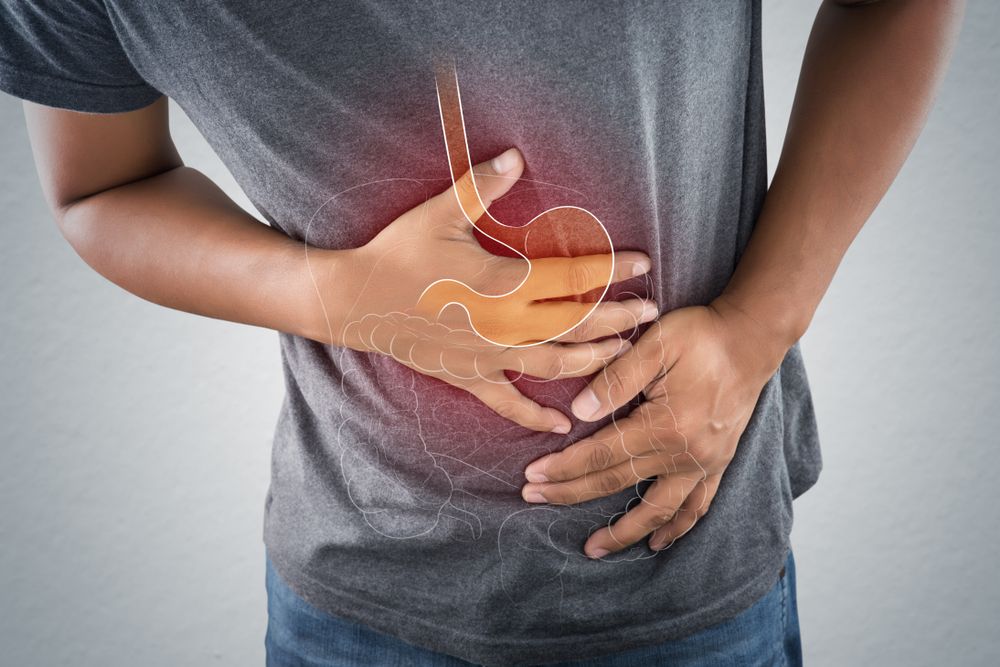Ulcerative colitis causes inflammation in the intestine and rectum. (Learn More: What Is Ulcerative Colitis?)
Crohn’s is a disease that affects any part of the digestive system, leading to inflammation and other symptoms that cause you to feel weak and may even threaten your life. (Learn More: What Is Crohn’s Disease?).
Both conditions are part of a family of illnesses called inflammatory bowel disease (IBD). As such, treatment for Crohn’s disease and ulcerative colitis can be similar. (Learn More: What Kinds of Treatments Are Available for Crohn’s or Ulcerative Colitis?)
If detected and treated in a timely manner, you can live a functional and normal life regardless of Crohn’s or ulcerative colitis. (Learn More: Prognosis)
Inflammatory Bowel Disease
This condition is one of the several health illnesses comprising inflammatory bowel disease (IBD). IBD includes gastrointestinal ailments that affect different parts of the digestive system, which starts at the mouth and ends at the anus.
The digestive system is in charge of breaking down food, absorbing its nutrients, and getting rid of waste. IBD interrupts this process and causes issues, such as vital nutrient deficiencies as your cannot properly absorb vitamins and minerals.
Ulcerative colitis and Crohn’s are some of the diseases that fall under the umbrella of IBD. Both diseases sometimes present serious symptoms, but they can also have periods of remission that may lead patients to believe their health issues are over.
What Is Ulcerative Colitis?
Ulcerative colitis is a disease that is often hereditary, affecting the rectum and lining of the colon (large intestine). Most people diagnosed with this condition have a close relative who also suffers from it, such as a sibling or parent.
Ulcerative colitis can cause:
- Inflammation in the lining of the large intestine and rectum
- Ulcers or small sores in the colon and rectum
The following are symptoms of this condition:
- Diarrhea
- Blood in feces
- Malnutrition
- Weight loss
- Odd sounds in the abdominal area
- Fever
Some people also experience these additional symptoms:
- Skin issues
- Joint swelling and pain
-
- Reduced appetite
- Nausea
- Inflammation in the eyes
- Sepsis
Causes of Ulcerative Colitis

The causes of ulcerative colitis have yet to be determined, but research has found a few potential reasons for why some people develop the condition:
- Genetic predisposition. Scientists have discovered that certain genes may influence the onset of ulcerative colitis. Data shows that certain ethnic groups are more prone to having the condition as well.
- Autoimmune issues. The immune system is in charge of fending off infections and bacteria. One assumption is that the immune system mistakes the healthy bacteria in the large intestine for unfriendly pathogens.
Another theory is that infections may set off the immune system, causing it to “stay on” and attack the lining in the colon. The last theory is that healthy and unhealthy bacteria are not balanced in the body, which may be a trigger for ulcerative colitis.
- Environmental factors. Research shows that where you live may influence the development of ulcerative colitis. People who live in countries with modern sanitation are more likely to be diagnosed with this condition, especially in Europe and North America.
What Is Crohn’s Disease?
Crohn’s can affect any part of the gastrointestinal tract. Like ulcerative colitis, it can affect the colon (large intestine), but it most commonly affects the ileum (small intestine).
Symptoms can appear one by one, or they may present suddenly. The following are signs of Crohn’s disease:
- Diarrhea
- Fatigue
- Blood in feces
- Sores in the mouth
- Stomach cramps
- Fistula, or drainage close to the anus area because of increased inflammation
Like ulcerative colitis, Crohn’s is associated with serious side effects, such as inflammation in the joints and eyes. Other related issues include stunted development and growth in children, and liver inflammation.
Causes of Crohn’s Disease
Research on the causes of Crohn’s disease shows that its root causes could be similar to ulcerative colitis.
- Environmental factors
- Genetics
- Autoimmune disorders
Symptoms of inflammatory bowel disease (IBD) and the conditions encompassed by this label present before age 30 or 35 in most people. However, both of these conditions can manifest at any age.
Diagnosis of IBD
Untreated IBD can lead to colon cancer, anal fissures, and bowel obstructions that may need to be surgically removed.
There various ways to diagnose ulcerative colitis and Crohn’s disease. When testing for either condition, your doctor will also rule out other possible triggers for your symptoms. Tests and tools that can help your doctor provide an accurate diagnosis include:
- At-home methods, such as keeping a journal of your symptoms or using an app to track inflammation in the bowels.
- A referral to a gastroenterologist who will conduct certain tests, such as:
-
- Electrolyte panel: Chronic diarrhea will cause imbalances in your electrolytes that will be visible on this test.
-
- Fecal occult blood test: This test examines excrement for blood remains that cannot be detected by the naked eye. The test will look for bacteria that could be causing blood to appear in the stool.
-
- Liver function tests: These tests focus on nutrient levels and try to find imbalances that could indicate your body is not processing nutrients correctly.
-
- Abdominal x-ray: This is a noninvasive way to know whether or not your bowels are obstructed, widened, or narrower than normal.
-
- Colonoscopy: A tube is inserted into the rectum and displays images as your doctor maneuvers it. This will show abnormalities that could be causing IBD.
-
- Upper endoscopy: A flexible tube will be inserted through your mouth. You will be given a numbing agent so you can be more comfortable. This will show images of your esophagus and abdomen, similar to a colonoscopy.

Inflammatory bowel diseases can resemble a parasitic infection. Make sure to consult your doctor if you are experiencing symptoms so you can receive a proper diagnosis.
Treatments
Crohn’s and ulcerative colitis both cause inflammation in the gastrointestinal tract. As such, treatment can be nearly identical because they are both under the IBD umbrella.
You can expect treatment to consist of one or more of the following:
- Aminosalicylates: These medications contain anti-inflammatory agents that can regulate inflammation. Common brands are sulfasalazine, mesalamine, balsalazide, and olsalazine.
- Antibiotics: These treat possible infections caused by complications related to Crohn’s or ulcerative colitis, such as fistulas and abscesses.
- Corticosteroids: Meant to treat moderate symptoms, these medications decrease inflammation related to IBD. Hydrocortisone and prednisone are commonly used.
- Immunomodulators: These medications depress immune system activity, but it can take weeks before their effects are felt. They can also decrease your white blood cell count, which makes it easier to get an infection. They are usually prescribed to patients who do not respond to less aggressive treatments.
- Bowel rest: This may include a liquid diet. If your symptoms are too harsh for other treatment, your doctor may prescribe this method to give your bowels a break if they are too inflamed. You may ingest a liquid orally, stay in a hospital to receive treatment via IV, or be fed through a tube.
- Fiber supplements: These add more bulk to stool and decrease diarrhea.
- Vitamin supplements: Iron, B-12 injections, calcium, and vitamin D may be recommended to ensure you are getting proper nutrition.
- Surgery: When medications do not work, surgery may be an option. It can address certain side effects of IBD, such as a fistula. The type of surgery would depend on your symptoms.
- Small bowel resection: A part of your small intestine may be removed if you develop a blockage. Two versions of this surgery exist.
- In open surgery, your doctor will remove one part of your intestine and connect your intestine once the diseased part is excised.
- With laparoscopic surgery, your doctor will use a tube to make small incisions and use those pathways to perform the surgery. The ends of your small intestine will be reconnected once the affected area is removed.
- Bowel resection: Similar to small bowel resection, this involves the removal of part of your large intestine (colon). A bowel resection can also be an open or laparoscopic surgery.
- Ostomy: A hole is created to allow your body to get rid of waste. It is referred to as an ileostomy when performed on the small intestine and a colostomy when utilized on the large intestine. It involves attaching a bag to the exterior of your body to catch waste. This can sometimes be reversed if your bowels heal enough.
- Small bowel resection: A part of your small intestine may be removed if you develop a blockage. Two versions of this surgery exist.
Prognosis
Ulcerative colitis and Crohn’s disease are difficult to deal with, but they can be managed. Treatment for either condition has not yet been standardized. Everyone responds to medication, surgery, and other treatment methods differently.
Treating either condition early can help you better manage it and live a normal life.
Frequently Asked Questions
What is ulcerative colitis?
Ulcerative colitis is a condition in which the large intestine is inflamed. This can cause ulcers, obstructions, and other complications such as malnutrition.
What is Crohn’s disease?
Crohn’s disease can affect any part of the digestive system, but it mostly affects the small intestine, causing inflammation, ulcers, fistulas, and other complications that can threaten a patient’s life.
Why are both conditions treated using the same methods?
Both Crohn’s disease and ulcerative colitis are inflammatory bowel diseases. Data shows that they may both be caused by genetics, environmental factors, or autoimmune reactions. Both conditions also cause inflammation in the digestive tract that prevents proper absorption of nutrients.
Since inflammation is inherent to both illnesses, many of the same treatments can mitigate and manage symptoms or complications of either condition.
Is surgery always necessary for these conditions?
No. People with mild symptoms of ulcerative colitis and Crohn’s disease are often able to get by with nutritional supplements, corticosteroids, immunomodulators, and aminosalicylates. However, treatment methods are not standardized, and everyone will respond differently.
Surgery can assist people whose bowels are blocked, but patients who respond favorably to noninvasive treatments do not need to worry about surgery initially. The unpredictable nature of IBD makes it difficult to know who will need surgery and when, so it is important to be prepared.
References
Crohn’s Disease. (September 2019). Mayo Clinic.
Treatment for Crohn’s Disease. (September 2017). National Institutes of Health.
Crohn’s Disease Treatment. (April 2018). National Institutes of Health.
What Is Crohn’s Disease? (January 2019). Medical News Today.
What Is Ulcerative Colitis? (January 2019). Healthline.
Ulcerative Colitis. (March 2016). Cleveland Clinic.
Ulcerative Colitis. (January 2019). National Health Service.
Inflammatory Bowel Disease. (September 2018). Healthline.
How Inflammatory Bowel Disease Is Diagnosed. (September 2019). Verywell Health.
Ulcerative Colitis. (January 2016). National Institutes of Health.
Surgery for Crohn’s Disease. (March 2016). Healthline.


